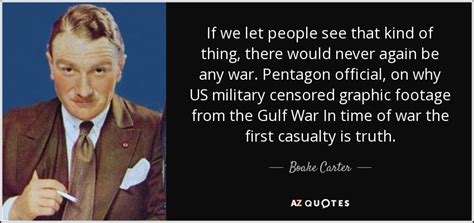A Quote by Paul Virilio
If we look at the Gulf War, the same is also true. Indeed, my work on the logistics of perception and the Gulf War was so accurate that I was even asked to discuss it with high-ranking French military officers. They asked me: 'how is it that you wrote that book in 1984 and now it's happening for real?' My answer was: 'the problem is not mine but yours: you have not been doing your job properly!'
Related Quotes
Our military superiority is so great - it's far greater than it was in the Gulf War, and the Gulf War was over in 100 hours after we bombed for 43 days. And so now they can bomb for a couple of days and then just roll into Baghdad... The odds are there's going to be a war and it's going to be not for very long.
In this way, it seems to me that, since 1984, my book on the logistics of perception has been proved totally correct. For instance, almost every conflict since then has involved the logistics of perception, including the war in Lebanon, where Israel made use of cheap drones in order to track Yasser Arafat with the aim of killing him.
If you look at the Gulf War or new military technologies, they are moving towards cyberwars. Most video-technologies and technologies of simulation have been used for war. For example, video was created after the Second World War in order to radio-control planes and aircraft carriers. Thus video came with the war. It took twenty years before it became a means of expression for artists.
The high level of the technologies used during the Gulf War makes this conflict quite unique, but the very process of de-realization of the war started in 1945. War occured in Kuwait, but it also occured on the screens of the entire world. The site of defeat or victory was not the ground, but the screen.
It's important to study and understand your responsibilities within any profession, but it's particularly important for military officers to read, think, discuss, and write about the problem of war and warfare so they can understand not just the changes in the character of warfare but also the continuities.
I opposed the Suez war, I opposed the Falklands war. I opposed the Libyan bombing and I opposed the Gulf war and I never believed that any of those principled arguments lost a single vote - indeed, I think they gained support though that was not why you did it. What has been lacking in Labour politics over a long period is a principled stand
In every major war we have fought in the 19th and 20th centuries. Americans have been asked to pay higher taxes - and nonessential programs have been cut - to support the military effort. Yet during this Iraq war, taxes have been lowered and domestic spending has climbed. In contrast to World War I, World War II, the Korean War and Vietnam, for most Americans this conflict has entailed no economic sacrifice. The only people really sacrificing for this war are the troops and their families.
I have no problem with a war for oil-if we accompany it with a real program for energy conservation. But when we tell the world we couldn't care less about climate change, that we feel entitled to drive whatever big cars we feel like, that we feel entitled to consume however much oil we like, the message we send is that a war for oil in the gulf is not a war to protect the world's right to economic survival-but our right to indulge. Now that will be seen as immoral.
I was a businessman. I was a real estate man and a businessman. That was the first time I think that question was ever even asked of me. That was long before the war took place. Joe Scarborough just released something yesterday more on point, much nearer. He put out a tweet saying that you know, "Trump is right, look what he just said." So you have to take a look at that. But regardless. The war in Iraq was a disaster. It was probably the worst thing. If you look at the Middle East now, all started because of that horrible decision to go into Iraq.

































